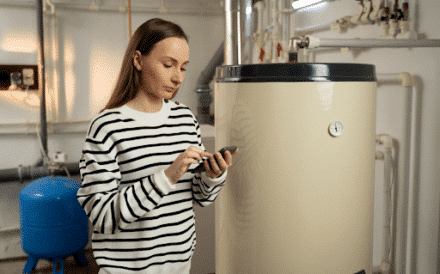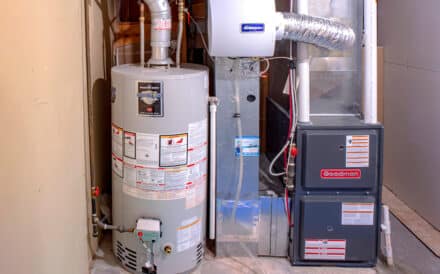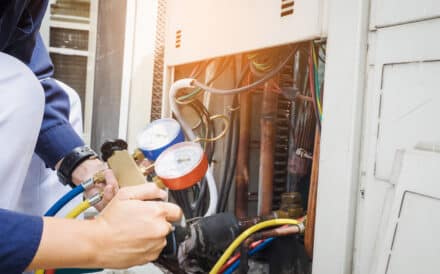How to Get the Right-Sized Heating System for Your Home
Choosing the right heating system for your home is more than just picking the most popular option — it’s about choosing one that fits your home’s unique needs. You want a system that can handle your entire home efficiently without wasting energy or leaving random cold spots around your home. From central heating systems to heat pumps, the size of your HVAC system plays a crucial role in how effectively it heats your home.
If you’re asking yourself, “How do I get the right-sized heating system for my home?” you’re already on the right track. A properly sized heating system will maximize energy efficiency and improve indoor air quality while keeping your utility bills in check.
Why Does Heating System Size Matter?
The size of your heating system is everything in terms of efficiency. A system that’s too small will struggle to heat your home, constantly working to maintain the temperature but falling short, leaving you out in the cold. On the other hand, an oversized system will heat too quickly, causing the system to short-cycle. This wastes energy and puts unnecessary wear on your heating unit, whether a gas furnace, heat pump, or electric furnace.
Additionally, heating systems that are too large or too small affect energy efficiency, leading to higher utility bills and inconsistent indoor air quality. You want a heating system that balances your home’s square footage with your heating needs, providing comfort without pushing your energy consumption through the roof.
What Happens If the Heating System Is Too Big for My Home?
Some people believe that having a larger system doesn’t matter in the grand scheme of their home’s overall comfort. However, if your current system is on the larger side, it could lead to a world of problems you must deal with sooner than later.
Heating systems that are too large heat the home too quickly, leading to short cycling. Short cycling increases energy costs and wears out your system faster, leading to more frequent furnace replacement services. Not to mention, oversized systems don’t allow the air conditioner or cooling system to dehumidify your home properly, leaving you with an uncomfortable environment. The heated air may feel hot, but the temperature will fluctuate, leading to unnecessary wear on your entire HVAC system and ultimately costing you more in energy bills. You want a system that heats evenly and maintains energy efficiency, keeping you comfortable without inflating your costs.
Finding the Goldilocks Fit
When it comes to heating systems, you’re aiming for the Goldilocks fit: not too big, not too small, but just right. To get the right size HVAC unit for your home, our team thoroughly assesses your home to figure out the best fit for your needs. These calculations determine how many BTUs (British Thermal Units) your home requires based on its square footage, existing ductwork, and other factors like insulation and the number of windows. Whether you need a natural gas furnace, oil furnace, or even a ductless mini split, finding the perfect size increases energy savings and generates better performance from your heating system.
Factors to Consider When Sizing a Heating System for Your Home
When choosing your next heating system, several key factors must be considered to ensure you get the most efficient and cost-effective solution for your home. Your heating needs will depend on more than just the size of your home. From energy efficiency to upfront costs, weighing all options before deciding is essential. Here’s what you should keep in mind:
- House square footage and BTUs: Your home’s size directly impacts the HVAC unit you’ll need, determining how many BTUs your heating system must provide to heat the space effectively.
- Energy efficiency: Systems like heat pumps, gas furnaces, and electric furnaces vary in energy consumption. Opting for energy-efficient models can significantly reduce your utility bills.
- Climate and fuel type: Your climate influences whether a natural gas furnace or a heat pump is the better option, while your home’s existing ductwork may dictate which system works best.
- Upfront costs vs. long-term savings: While the initial cost of a new furnace or HVAC installation can be high, energy savings over time with an energy-efficient system can balance out the investment.
- Existing ductwork and cooling needs: If you have an existing HVAC system or ductwork, ensure your new heating unit fits seamlessly. If you’re considering cooling systems like air conditioners or ductless mini splits, factor that into your decision.
These considerations will help you choose the right heating system that balances energy costs, comfort, and long-term reliability.
Trust Silver State With Your New Heating System Installation
At Silver State, we don’t just install heating systems; we provide professional installation services tailored to your home’s specific needs. Whether you’re looking for a gas furnace, oil furnace, heat pump, or a full HVAC replacement, our HVAC professionals are here to make sure your heating and cooling system runs efficiently. We assess your home’s size, energy consumption, and the condition of your existing system to recommend the best solution for your heating needs.
We work with energy-efficient systems to help you save on energy bills and improve your indoor air quality. From ductless mini splits to traditional central heating systems, we offer a wide range of solutions, backed by expertise in sizing and installing HVAC units to keep your entire home comfortable. With Silver State, you’re choosing reliability, energy savings, and a heating system built to last.




